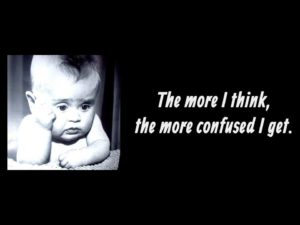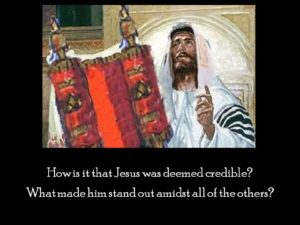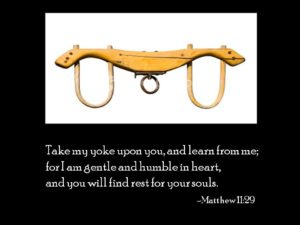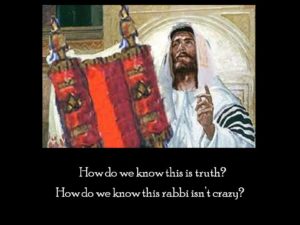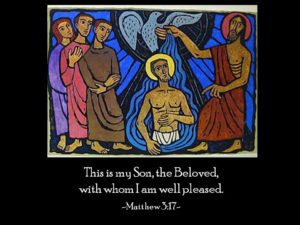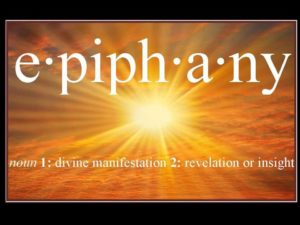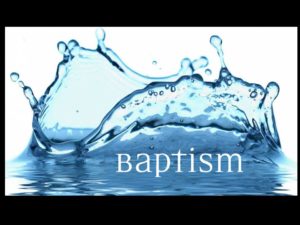Then Jesus came from Galilee to John at the Jordan, to be baptized by him. 14 John would have prevented him, saying, “I need to be baptized by you, and do you come to me?” 15 But Jesus answered him, “Let it be so now; for it is proper for us in this way to fulfill all righteousness.” Then he consented. 16 And when Jesus had been baptized, just as he came up from the water, suddenly the heavens were opened to him and he saw the Spirit of God descending like a dove and alighting on him. 17 And a voice from heaven said, “This is my Son, the Beloved, with whom I am well pleased.”
Matthew 3:13-17
Remember the good old days when “fake news” was confined to the racks in the grocery store checkout lines. Where we could read in the National Enquirer and other tabloids, all kinds of outlandish headlines about celebrities and government officials and aliens and all manner of craziness.
They were fun or downright silly, but I never remember anyone falling for those stories – thinking they were true. It doesn’t mean they weren’t somehow entertaining or made us marvel at the endless imaginations of some people, but there never seemed to be the need to try and figure out if these stories were actually true.
They were easily discernible.
Lately, however, it seems, discerning truth and factual stories and reporting has become that much more difficult. When it shows up in our newsfeed – or when a friend shares something or likes a page or retweets – all of a sudden, some incredible, outlandish stories gain legitimacy – and it can be tough to sort fact from fiction.
While we may think of this as a 21st century problem – it is truly age-old. Discerning who to believe and what to believe is as old as humanity and was certainly a part of life in 1st century Palestine where we find Jesus in the beginning chapters of Matthew.
In a world where many claim authority – where many claim to be keepers of the truth – how is it that Jesus was deemed credible? What made him stand out amidst all of the others?
Rob Bell writes about this in his book “Velvet Elvis”:
Different rabbis had different sets of rules, of what they forbade and what they permitted. A rabbi’s set of rules were really that rabbi’s interpretation of how to live the Torah. And it was called that rabbi’s yoke.
So when we hear Jesus invite people with the words:
Take my yoke upon you, and learn from me; for I am gentle and humble in heart, and you will find rest for your souls. (Matthew 11:29)
Jesus is inviting people to follow his teaching – to enter into a new way of living – a new way to be.
The rabbi Jesus was teaching a new yoke, a new way of interpreting the Torah.
Rob Bell continues:
Imagine – A rabbi was claiming that he had a new way to understand the Scriptures that was closer to what God intended than the way of the rabbis who had come before him.
The questions would immediately be raised: “How do we know this is truth? How do we know this rabbi isn’t crazy?
One of the protections for a rabbi in this kind of situation was that two other rabbis with authority would lay hands on him and essentially validate him. In doing so they would be saying, “We believe this rabbi has authority to make new interpretations.”
That’s why the story of Jesus’ baptism was so important. It wasn’t that Jesus needed to be baptized in order to have his sins washed away – it was so that his presence and authority could be affirmed.
And that affirmation comes from two authorities in this story. First, John the Baptist a powerful teacher and prophet in his own right, who was very clear in pointing to Jesus as the one to follow.
And then we hear the ultimate affirmation, a voice from heaven that says: “This is my Son, the Beloved, with whom I am well pleased.” (Matthew 3:17)
John and the voice from heaven, both affirming Jesus’ authority and calling. Jesus’ baptism becoming that defining moment in discerning who Jesus was and ultimately who we are too.
It is fitting that we would hear this story of baptism in the season of Epiphany – for epiphany means “appearing” or “revealing” – it is the season of the Magi and gifts and a star – a season of descending doves and heavenly voices – a season of water and wine and transfiguration. It truly is a season of “God moments” – beginning today with baptism.
We likely have some favorite stories about baptisms from our own families or from witnessing them in worship – from babies grabbing microphones or squirming in the arms of the pastor.
There’s a story of a two year old boy who was being baptized one Sunday. In the course of the rite, the pastor placed his hand on the little boy’s head and said, “You are a child of God, sealed by the Holy Spirit in your baptism, and you belong to Jesus Christ forever.”
The little boy looked up and responded, “Uh-oh.”
Of course, people laughed, but truly this was a “stunning theological affirmation” from the mouth of a child.
The kid was right. Baptism is an “uh-oh” kind of event. “Uh-oh” in that we are called into something new, something we can’t control, something that may lead us into places we have never quite imagined. This is where the story of Jesus’ baptism intersects with our own.
But here’s the thing about that intersection – it is full of promise.
Baptism is nothing less than the promise that we are God’s beloved children. That no matter where we go, God will be with us. That no matter what we may do, God is for us and will not abandon us. These promises are the real story of baptism – the yoke that Jesus invites us to take on.
But this story of promise is not always the story we tell ourselves. Instead, we hear the story inside our heads about just what a failure we truly are or how if people really knew us, they would run away or that we are not talented enough or smart enough to be beloved by God – or perhaps even worse yet, that God’s love and promise don’t matter.
We live in a world where the truth can be in short supply. And we are people for whom self-doubt and self-criticism can overwhelm and paralyze.
Which is why we need to be reminded of the story and promise of baptism over and over – to hear again the truth – the good news – that we belong to God – that we are beloved by God – that we are a part of the larger story, the larger circle of God’s presence in the world.
Mother Theresa was once asked, “What’s the biggest problem in the world today?” And she answered without hesitation, “The biggest problem in the world today is that we draw the circle of our family too small. We need to draw it larger every day.”
In Jesus’ baptism the circle of God’s love and presence in the world has not only become larger, it has become all-encompassing – inviting us to live into this new reality, to open our own hearts and minds and lives to the world and the people around us. This truly is Good News.
Let us pray: Voice of heaven, speak your love into our lives. Teach us to trust you. Help us to discern true from fake, in ourselves and in others. Renew in us the promise and calling of baptism, remind us that we are loved, that we are yours. Use us as your living word in this world, to reach out, to bless, to work for justice and peace, in the beloved name of Jesus. Amen.
Rev. John Berg
Gloria Dei Lutheran Church
Northbrook, IL
Sources:
Brian Hiortdahl, Faith Lens, “Whom Do You Trust?”
Rob Bell, Velvet Elvis: Repainting the Christian Faith
John Buchanan “You Are a Child of God…Uh-Oh”
Brett Blair, We Draw the Circle Too Small
David Lose, Working Preacher
Debra Samuelson: Tattooed for Life



